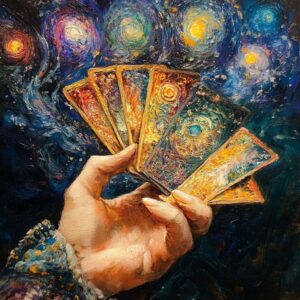
Tarot Cards and Psychology - In the world of psychological therapy, where the goal is to promote self-understanding and healing, various tools and methods are used to help individuals explore their inner selves and cope with mental challenges. One of the most intriguing tools that has been gaining renewed popularity in recent years is Tarot cards. Despite the common perception that Tarot cards are primarily a tool for predicting the future, many psychologists and therapists recognize their significant potential in fostering internal processes, self-understanding, and inner discovery.

Tarot cards contain symbols and images rich in meaning, reflecting archetypes, emotional states, and life situations.
Examples of symbols appearing in Tarot cards:
In psychological use, Tarot cards serve as a tool for understanding the subconscious and uncovering internal content that may not be readily accessible through other methods. Through the cards, patients can express and explore their feelings, fears, hopes, and dreams.
Therapists who incorporate Tarot cards into their practice do not necessarily aim to predict the future or offer prophetic answers but rather to use the cards as a way to initiate dialogue with the patient. The cards serve as a starting point for discussion, allowing the patient to express experiences and emotions in non-verbal ways, often leading to deep self-insight

One prominent example of using Tarot cards in psychology is the process of "dialoguing with the subconscious." In this process, a patient intuitively selects a card, and the therapist guides them in exploring the symbols and images on the card. The goal is to encourage the patient to narrate the story they see in the card, revealing insights and emotions that exist within their subconscious.
Another example is the use of Tarot cards as part of trauma processing. Specific cards can help patients express and process emotions related to traumatic experiences, identify with images that reflect their mental state, and begin the healing process.
Tarot cards are also used as a tool for enhancing empathy and self-understanding in relationships. In couples therapy or workshops, cards can be used as a conversation tool, where both partners choose cards they believe represent their feelings or the dynamics of their relationship. This method allows for the discussion of topics that may be difficult to express in words, helping both parties better understand their own and their partner's emotions.
Additionally, Tarot cards can be employed in managing anxiety and fears. Patients are asked to select a card they believe represents the source of their anxiety or fear. The therapist then works with the patient to deconstruct the symbolism of the card and explore ways to address the anxiety or fear in a healthy and conscious manner.
Another example is using Tarot cards to encourage personal development and growth. Individuals can select a card daily as a way to focus on a trait or challenge they wish to work on. The aim is to use the messages and symbolism of the cards to direct attention to areas needing improvement or growth, helping the individual make more conscious decisions in their everyday life.

Using Tarot cards in psychological therapy highlights the power of self-understanding and inner discovery. By engaging with the imagery and symbols in the cards, patients can develop greater self-awareness, gain insight into their thought patterns and behaviors, and uncover valuable revelations that can assist them in their daily lives.
Ultimately, Tarot cards serve as a powerful tool for self-exploration and inner discovery. When combined with a guided psychological approach, they can offer a new and meaningful way to address mental health challenges, foster personal growth, and support each individual’s journey toward self-discovery and healing.


Orit Raphael, Tarot Reader for Personal Guidance, Insights, and Messages